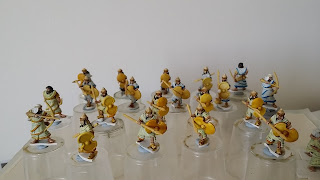Perth is my hometown. I went along to the new Museum on the opening weekend. The new Museum used to be the City Hall and in addition to museum exhibits, the building now houses the Stone of Destiny (aka the Stone of Scone, the wee magic stane, etc.).
Cannot help but recall Terry Pratchett here and his homage, The Scone of Stone.
Entrance is free, though you do have to book a time-slot to see the stone. If there are temporary 'side' exhibitions in some rooms, you may have to pay to see them.
Here are some more pictures that caught my eye.
First, bronze age swords recovered from the river Tay. The accompanying text mentioned a possible religious significance of placing swords in water, which made me thing of tales of the Lady of the Lake and Excalibur and if there's a folk memory of such things.
Also couldn't help but think of "Listen, strange women lying in ponds, distributing swords, is no basis for a system of government".
A standing stone inscribed with Celtic designs. There is a light display that highlights each element of the designs in different colours over a period of a few seconds.
A picture of the basic standing stone.
Sword remnants from the Viking era.
A buff coat and armour from 1650-ish. From the time when Cromwell visited. It's interesting to see these things for real.
Some French Revolution and Napoleonic stuff. This is a barrel of a ships cannon, set on a display carriage. The text says a small battery of similar guns was set up on a hill outside Perth at the time, no doubt to deter the French from sailing up the river Tay.
This is a militia sergeant's uniform c. 1810. The sabre and sword are of the time but the shako is post-1815. The red of the uniform is quite bright and I can only assume it was kept inside and not exposed to the elements. Also noteworthy here is how dark the blue facings are.
And the militia standard. As with official standards, it is about 6 foot square, though material seems quite thin.
Some pieces from the Great War. The rifle is German and the gas mask and face protector look very uncomfortable.
Last bit. The picture is of Mary Cathcart, wife of Sir Thomas Graham of Balgowan, later Lord Lyndoch. She died while they were on a grand tour in the 1790s.

The accompanying text is a bit too brief, for me. I wish that they had added that after French Revolutionary customs officials broke open her coffin, an angry Thomas Graham went home to Perth and raised a regiment of foot at his own expense and from men he could recruit locally. This regiment became the 90th (Perthshire) regiment of foot and served in the Mediterranean during the Revolutionary and Napoleonic Wars.
Thomas Graham himself served in the Peninsula under Wellington and commanded the army in the victory at Barossa. That's why we have a Barossa Street and Barossa Place in Perth and a statue to Graham on the north inch.
Note: the inches is the name for the open parklands on the north and south sides of Perth. North Inch and South Inch.
Anyway, I'll visit the museum again and a bit more slowly to see other exhibits more closely. There is more on ancient bronze age items, a colonial section and more modern displays.



















































